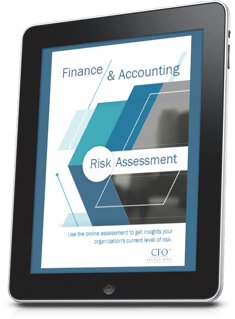
Risk isn't just for actuaries! As a business owner, there are risks everywhere, and a financial assessment can help identify areas where your company might be vulnerable to risk, determine your company's attitudes towards risk, reinforce your strengths, and ensure that you are able to take advantage of valuable opportunities.
The key focus of a financial risk assessment is a deep dive into a company's financial preparedness and it includes pieces of other areas as they relate to financial stability. The assessment can point out areas that are working and those that are not, in time to make necessary course corrections.
Every business owner should think about performing a financial risk assessment of their company on a regular basis. The cadence is different for every industry, size, and type of company, but at a minimum once per year.
The results of a financial risk assessment will feed into the strategic planning process and budgeting. A consistently profitable company who is not worried about potential risks may still be missing something that could either blow up or cause them to miss opportunities.
Potential Costs of Not Thoroughly and Frequently Assessing Risks
There are several types of assessments a company can perform on a regular basis. These include operational, information technology, sales effectiveness, human resources/people-based, and financial risk. But, what if you decide to rest on your laurels and forgo these reviews?
In the case of a financial risk assessment, the potential costs could be astronomical. Some of these might include:
- Landmines may be lurking in the balance sheet. Examples include: liabilities not properly recorded, future loan/lease payments not planned for, poor equity timing, expenses not accounted for properly on the P&L vs. balance sheet. Financial statements kept in cash format vs. GAAP can lead to missing these potential landmines.
- Physical inventories not performed can lead to adjustments on the balance sheet that could cause a negative equity situation if not reviewed regularly.
- Missing internal controls could lead to improper usage of company funds.
- Without a strategic plan in place, the company cannot grow to its full potential.
- External relationships (banking, audit, legal, insurance, etc.), if not revisited, can become stagnant.
- Is the company in line with its competitors? Even if it is profitable, is the company in line with the rest of the industry?
- What are the financial best practices for the industry, and is the company tracking with these?
Still Not Convinced? Here is Why a Company Financial Risk Assessment is a Must
A risk is a situation that can cause serious damage to your organization but can also present huge benefits. So, it's not all doom and gloom. But, ignoring major financial risks can certainly result in the failure of a business.
For example, major retailer Target ignored the financial risks of a data breach and ended up with PR nightmare, and an $18.5 million class action settlement after the personal data of 41 million customers was leaked. The company didn't fail, but it did lose goodwill that it could have retained with the right type of risk assessment.
On the flip side, these exercises can also help grow your business. Your company will become more proactive and able to take advantage of income-producing opportunities. Here is a list of the benefits to be gained by performing a financial risk assessment for your business.
- Gain clarity on what is working and what is not working
- Provide a solid groundwork for decision making
- Assess financial risk
- Build a strategic plan
- Prepare for growth
- Reach or build profitability
- Be ready to take advantage of opportunities
Both new and established companies will benefit from a financial risk assessment performed periodically. The cadence depends on the company. It could be quarterly, yearly, or as needed.
Areas to Look at When Doing a Financial Risk Assessment
When you have your financial risk assessment done, a systematic approach to this process is vital. This will ensure that nothing falls through the cracks. That being said, this isn't a cookie-cutter process because your business and industry is unique. What is standard for you may not be so for another company or sector.
A team of qualified professionals will approach every financial risk assessment with a trained eye, here are some of the key areas they look at during this process. They mirror the list we mentioned above with some additional details.
- What is working and what isn’t working?
- Systems, processes, and people
- Are the right systems in place for growth?
- Do your processes protect your company against risks?
- Are the right people in the right jobs?
- Systems, processes, and people
- Is the right groundwork in place for decision making?
- Are you getting the quality and quantity of data you need to make business decisions?
- Is data collection and delivery timely?
- What financial risks do you currently face?
- Market risk
- Are you tracking changing conditions in the industry?
- Are you up to date on the competition in the industry and area?
- Credit risk
- Does the company have sufficient cash flow to pay its bills?
- Are customers paying on time or taking advantage of inefficiency?
- Liquidity risk
- Is the business subject to general or seasonal downturns?
- How easily can you convert assets to cash if a need arises?
- Operational risk
- Are you prepared for risks involving lawsuits, fraud, or personnel issues?
- What insurance policies and controls are in place?
- Market risk
- Is your company prepared for growth?
- Are you tracking with your strategic plan with regards to growth?
- If a plan isn't in place, what steps will you take to grow your business?
- Do you need to drive profitability and/or adjust to gain efficiencies?
- What is your company’s profitability status? (Interestingly, massive companies like Uber, Snapchat, and Spotify are not profitable.)
- Can you increase prices or shorten your sales cycle to improve margins?
- Will profitability improve by speeding up the design cycle?
- Can you identify waste to eliminate or other costs to cut?
- Are you ready to spot and take advantage of opportunities?
- Are you getting the information you need to spot new business opportunities?
- When an opportunity arises, do you have the resources available to pursue it?
Key Business Components to Review in a Financial Risk Assessment
These are the key components of your business that should be reviewed and a few questions that will be asked during the assessment process.
- General
- Company structure. Is your company structure appropriate for the business and its owners? Does it provide the best level of protection from financial risks? Do you have succession planning in place?
- Management team and Board of Directors make up. Are there gaps in your top management team or board that you should address? Do you need assistance filling these positions?
- Historical financial statements and management reports. Do you have easy access to these reports and use them to benchmark progress?
- Facilities
- Have you conducted a lease vs. buy analysis for every location? Is it time to renegotiate any leases? Are there any embedded leases that require monitoring?
- Does your company do business out of state, even through third-party vendors? If so, there is an out of state nexus risk that you'll have to consider (read about the Mattress World tragedy here.)
- Human Resources
- Are key contracts in place? Are there any gaps?
- Are HR policies distributed and acknowledged? Are they being followed?
- Finance team and payroll
- Are the systems right-sized for the company today and tomorrow? What immediate upgrades might be required?
- Are there documented processes in place to protect the company and its people? Do any gaps need to be filled?
- Are the right people in the right jobs? If not, what's the best way to get them there?
- Are federal requirements being met for taxes? What about state taxes and any issues relative to out of state sales?
- Sales
- Are contracts in place, and are they being followed and recorded correctly?
- Is revenue recognition being done correctly?
- Financial
- Internal controls. What are your internal controls, and are they adequate?
- Banking controls. Are banking controls in place and followed?
- Are financial reports adequate for management to run the business? Is ‘What-If’ analysis available to help with strategic decisions?
- Is a budget in place and reviewed on a set schedule? What are the parameters for adjusting the budget?
- Does the company have an annual audit or review? Is this internal, external, or both?
- Are your tax returns filed timely and accurately? Have there been any shortfalls?
- Board of Directors. Are budgets and strategic plans in place and reviewed by the board? How is feedback handled?
- Debt & Equity. Is the company's Debt/Capital structure adequate? What can be done to improve these positions?
- Bottom line. What would it take to get to break even if not profitable? What can the company do to improve margins?
- Management information systems
- Look for risks in current systems. Are they susceptible to an internal or external breach?
- Look for opportunities to strengthen systems and processes.
The information gained by this exercise should go into an updated business plan to help the company reach its goals.
Client Assessment Successes
CFO Selections® provides financial consulting services as well as executive search services. These are examples of cases where we've worked hand-in-hand with management to complete a financial risk assessment.
Client A
… came to CFO Selections® because they wanted to grow their company and needed help with understanding the key areas to focus on to reach their goals. Specific areas of focus for this client included:
- Review of company financial records
- Review of operations
- Review of the strategic planning process
- Review of existing contracts, leases, financing agreements
- Review of facilities, current operation plans, and needs
- Interview of key employees, outside bookkeeping representative
We performed a 2-day assessment and at the end, prepared a list of recommendations and suggested areas of focus for the management team. A few examples of the suggestions included:
- Set up a Financial Statements structure per GAAP, including the ability to track the profitability of individual retail outlets.
- Review the sales and distribution process for efficiency.
- Develop a Dynamic Financial Forecasting Model.
- Develop and document strategic plans or initiatives.
- Establish and maintain banking lending relationship to meet corporate short-term requirements.
We were able to help them work through the various areas of focus to guide them towards their growth goals.
Client B
… came to CFO Selections® because the company was in the middle of a major transition between owners. They asked us to do an assessment of the financial controls, operations, equity, and risks.
The primary goal was to split out certain locations and product lines between owners in a fair and equitable manner. This is not the same as a valuation exercise, but rather a deep dive into the financial stability of each line of business. A similar approach was used focusing on the following areas:
- Banking relationships
- Financial controls and records
- Facilities and Operations
- Key people
- Systems
At the conclusion, recommendations were given, and the company is working towards the best possible outcome for all parties.
 A financial risk assessment can make all the difference for your business. Preparing to take advantage of opportunities and eliminate potential landmines makes good business sense.
A financial risk assessment can make all the difference for your business. Preparing to take advantage of opportunities and eliminate potential landmines makes good business sense.
Get instant access to our free finance and accounting risk assessment!
Contact CFO Selections® now with any questions about our services.
About the Author
 Becky Todd, Western Washington Practice Manager, CFO Selections
Becky Todd, Western Washington Practice Manager, CFO Selections
Becky is an experienced financial leader with over 20 years of experience in industries that include nonprofits, aviation, software, and retail. She has extensive expertise in helping small to mid-size companies and organizations gain control over their accounting/finance operations and apply their financial assets to support the accomplishment of key organizational objectives.
As the Western Washington Practice Manager for CFO Selections, Becky ensures the alignment of the right CFO consultant to client organizations. Becky can be reached at btodd@cfoselections.com.






